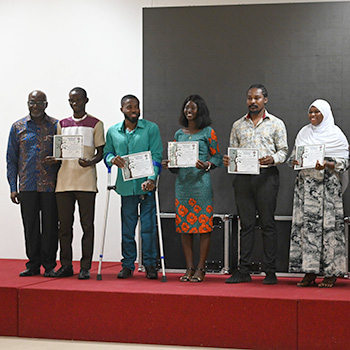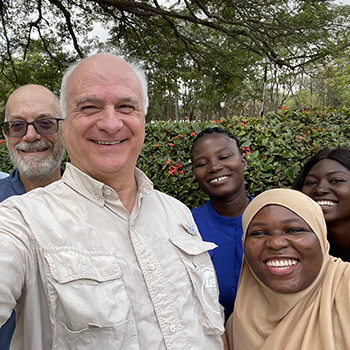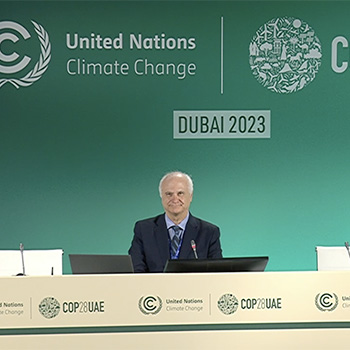Search for academic programs, residence, tours and events and more.
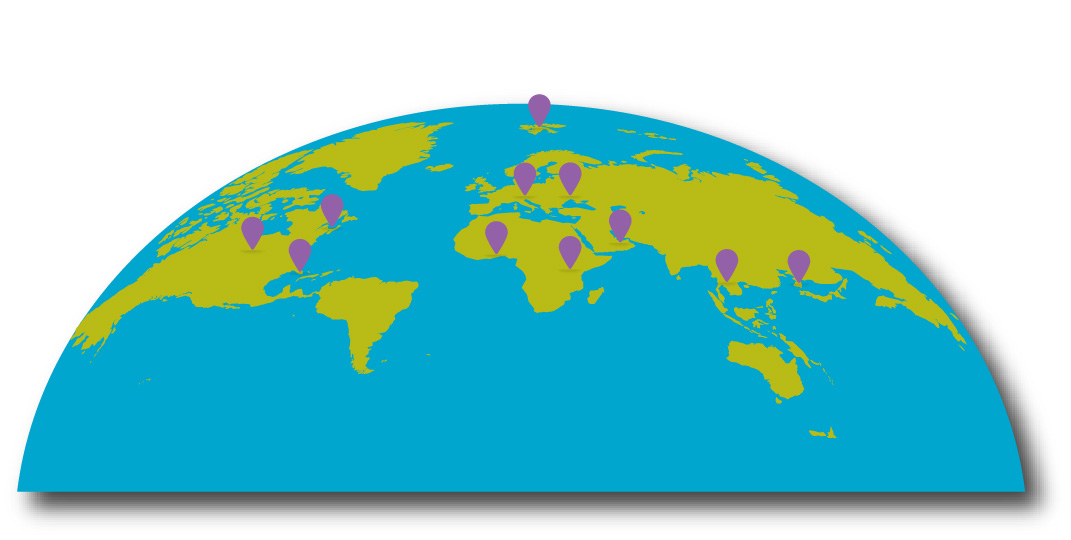
Research can be done with books and beakers, but for many discoveries you’ve got to get out of the lab. That’s why researchers at Wilfrid Laurier University are frequently on the road, conducting fieldwork in far-off locales.
In 2023, Laurier faculty members travelled across Canada and around the world to study topics including digital archives, honeybee breeding and drought. A sampling of scholars shared their travel stories, including the real impacts they hope to make through their research.
Christina Han
Associate Professor, History
As a historian and curator, Christina Han is working to avoid the looming “digital dark age”: a time when historical information is difficult or impossible to retrieve because it has been saved on obsolete or corrupt digital technologies. She is part of the Big Data Studies Lab, a team investigating the future of digital archives.
In June, Han travelled to the Arctic World Archive in Svalbard, Norway, the northern-most city in the world. The decommissioned coal mine has been converted to a secure underground data vault. The frozen ground surrounding the facility acts as natural, sustainable refrigeration and the storage technology is believed to be immune to cyberattacks. Han delivered meaningful historical materials for long-term preservation. She is only the second Canadian to ever visit the archive.
“My deposit included documents pertaining to Six Nations land rights, a collection of classical Korean texts known as ‘poetry-talks,’ which I am actively researching and translating, as well as images showcasing my chopstick collection and postcards featuring Chinese restaurants,” says Han. “It is exciting to know that my collection will be preserved there for the next 2,000 years and become part of the world’s memory bank.”
This was Han’s first trip to the Arctic and she was delighted by the “stunning” landscape, the 24-hour sun and seeing reindeer outside of her window. She brought back valuable knowledge about the archive’s data storage technology to share with her research team, which will continue to strategically safekeep digital materials for future generations.
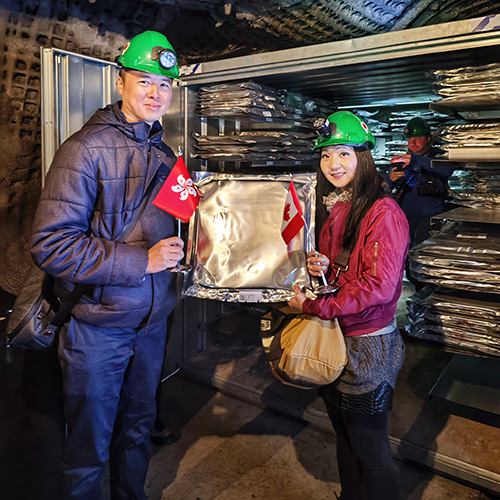
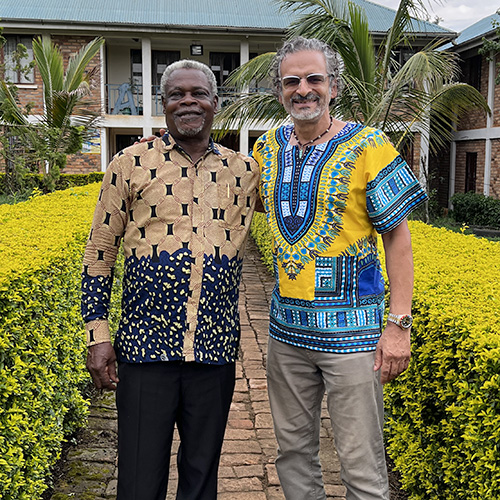
Akbar Saeed
Associate Professor, Business Technology Management
During the month of August, Akbar Saeed visited Uganda and Ghana to foster local innovation and entrepreneurship. He began in Kampala, Uganda, where he has been working with an NGO called Caring Hands to understand the training and support needs of street vendors. Known as “solopreneurs,” they typically turn to entrepreneurship out of necessity and a lack of job opportunities.
“Last year, we gave five young solopreneurs working capital of $200 each. In August, I interviewed them to see how they coped with the repayment,” says Saeed. “Without any collateral or legal contract, four of them repaid the loan. The other participant was only able to repay half of the loan because the government destroyed the slum area where he had his makeshift stall.”
These results will be the foundation of a larger research partnership focused on developing training and support systems for solopreneurs and their community-based business ventures. Saeed hopes to develop best practices for grassroots NGOs to replicate globally.
From Kampala, Saeed travelled 290 km northwest to Kagadi. He spent two weeks teaching a course called Community-Based Participatory Action Research at African Rural University, a small university for women that offers a Bachelor in Rural Development degree.
“Once they graduate, these women are employed by the university as epicentre managers and stationed in communities with the task of bringing real, impactful change,” says Saeed. “I keep returning to volunteer here because I strongly believe in their mission.”
Saeed ended his trip to Africa in Sunyani, Ghana, where he delivered a keynote address focused on sustainable innovation at an international conference.
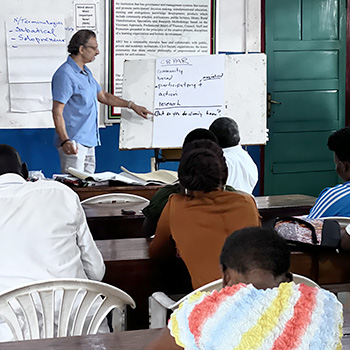
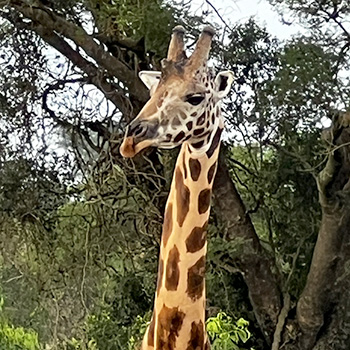
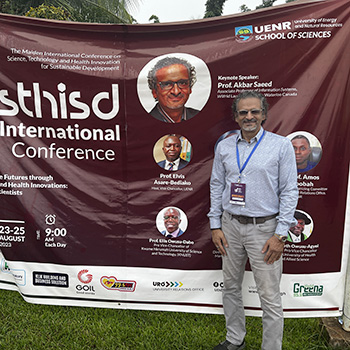
Jason Venkiteswaran
Associate Professor, Geography and Environmental Studies
For more than 20 years, Jason Venkiteswaran has been visiting the International Institute for Sustainable Development Experimental Lakes Area (IISD-ELA), a natural laboratory consisting of 58 small lakes and their watersheds. It is located in a sparsely populated area of Kenora District, Ont., 2,000 km northwest of Laurier’s Waterloo campus.
“The greatest thing about working at IISD-ELA is the ability to combine long-term datasets with whole-ecosystem experiments,” says Venkiteswaran. “There are so few places in the world where we can use lakes to answer really big questions. Lab experiments are small and short-term and can’t incorporate a full food web, so why not do experiments out in the real world?”
Venkiteswaran’s research program seeks to identify the triggers or necessary preconditions of harmful algal blooms. Currently, he is focused on cyanobacteria-dominated blooms, which can produce toxins in lakes throughout Canada and globally. If Venkiteswaran can determine which sequence of events in lakes leads to cyanobacteria blooms, there is potential to intervene, stop that sequence and eliminate the toxin risk.
“I do fundamental and applied environmental research with the goal of making tools and knowledge available to other scientists and decisionmakers,” says Venkiteswaran. “This is environmental problem solving.”
IISD-ELA is also a prime location to recruit future Laurier graduate students and Venkiteswaran enjoys sharing his research with young, eager researchers.
“I want to help train the next generation of scientists and environmental problem-solvers,” he says. “The whole-ecosystem approach at IISD-ELA means students have a great opportunity to learn about all aspects of lakes and how they fit into the larger landscape.”
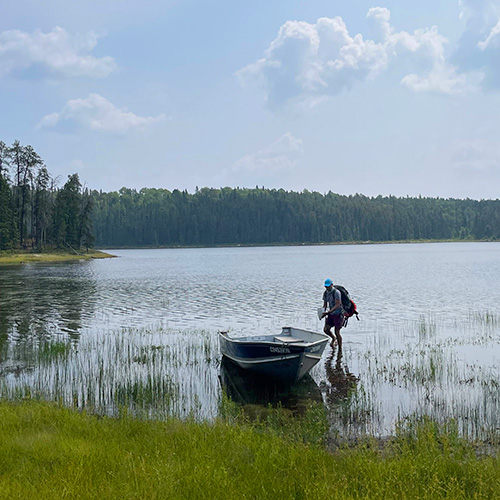
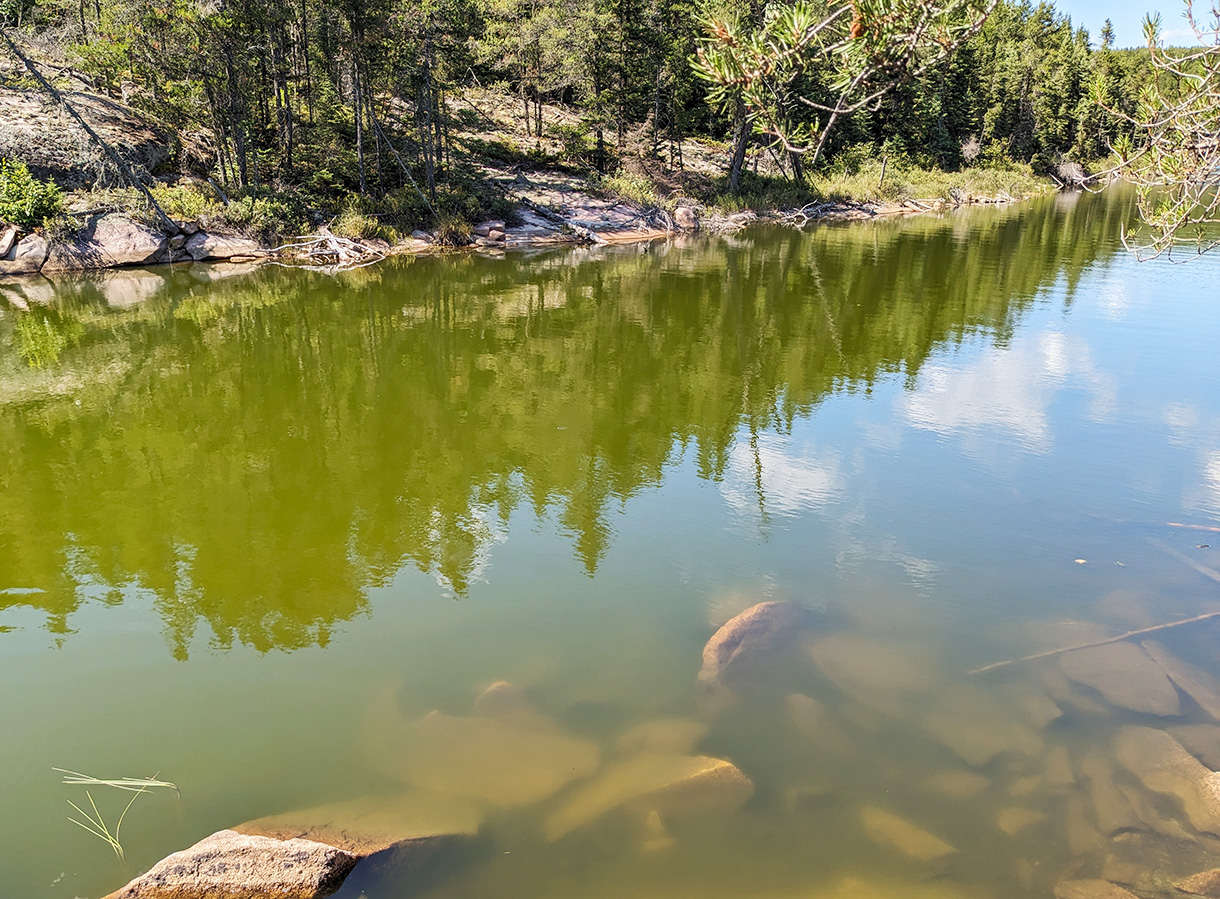
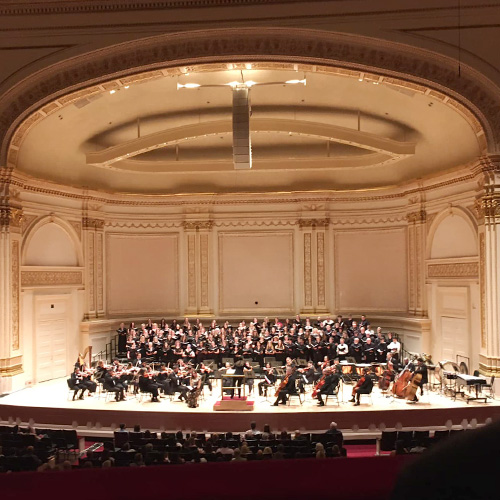
Kira Omelchenko
Associate Professor, Music
Kira Omelchenko, director of the Laurier Symphony Orchestra, took her skills abroad this year, conducting 39 pieces and two operas in five different countries. She is spending her sabbatical diving into new musical adventures and curating inspiration for her scholarship.
“Conducting is about connecting with others and communicating musically through non-verbal physical gestures, so it’s important for me to get to know people and experience music from different perspectives,” says Omelchenko. “Meeting and working with diverse musicians from a variety of countries inspires me to continue thinking outside of the box, be creative in my programming and view orchestral music from a global perspective.”
Omelchenko’s sabbatical began in New York City this past summer with a guest conducting engagement at Carnegie Hall, which she calls a “dream come true.” She then jetted overseas for a residency with the Vienna Opera Academy, a guest conducting engagement at the International Music Festival in Bangkok, and orchestral work in Seoul, South Korea. Back in North America, Omelchenko conducted concerts with the Waterloo Chamber Players and the Orlando All-County Symphony Orchestra. She also completed a residency with the Prince Edward Island Symphony Orchestra.
Along the way, Omelchenko made time to explore, try local foods, hike mountains, swim under waterfalls, visit the homes of Mozart and Beethoven, and submit articles to academic journals.
“I look forward to sharing my experiences with Laurier students when I return, along with the new orchestral pieces I’m conducting and new composers I'm discovering,” says Omelchenko.
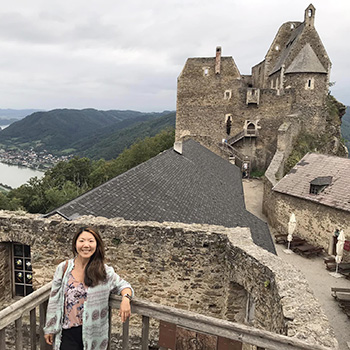
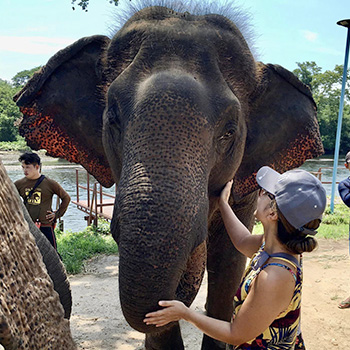
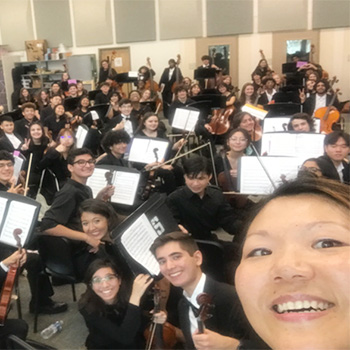
Tanya Richardson
Associate Professor, Anthropology and Global Studies
In the Transcarpathia region of western Ukraine, Tanya Richardson drove through picturesque countryside and villages en route to an unusual research site: apiaries nestled between mountain peaks. She was there to learn about keeping and breeding Carpathian honeybees, a breed known for its resilience that was recently approved for import to Canada. Russia’s 2022 invasion of Ukraine heavily disrupted the country’s thriving beekeeping industry.
“While many Canadians are interested in these bees, they tend not to be aware of their history and the challenges of maintaining them in Ukraine,” says Richardson. “I want Canadian beekeepers to understand the intellectual and physical labour that enables them to buy these queen bees and the identities of their breeders.”
Richardson spent seven weeks at various altitudes across Ukraine and neighbouring Moldova. Because the Carpathian species is so important for local agriculture, breeders make use of remote areas in national parks and forests for conservation. Richardson helped beekeepers attach wax foundations to frames and extract honey and observed them removing queen cells to place them into mating hives. She also interviewed retired honeybee researchers from the Prokopovych Beekeeping Institute and collected archival documents to tell the “remarkable story of these bees.”
This was Richardson’s fifth trip to Transcarpathia since 2016, but her first since the Russia-Ukraine war began. With Ukrainian airspace closed, she faced challenges when leaving the country and ultimately travelled to three different border crossings. Despite that, Richardson’s lasting memories of her trip are of the “ingenuity, creativity, hard work and generosity” of her research collaborators and the beauty of the region.
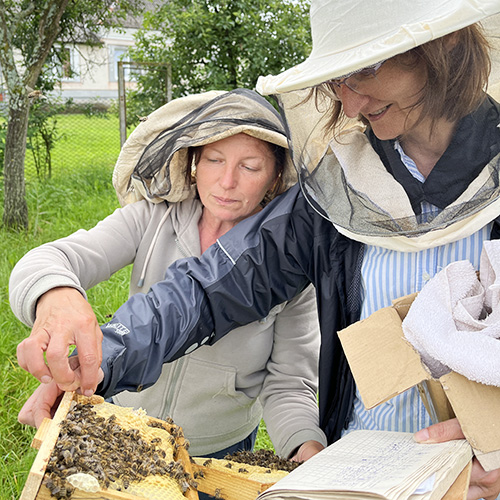
Richardson (right) helping Alla Kizman-Baiza, a honeybee researcher and breeder at Ukraine's Prokopovych Beekeeping Institute
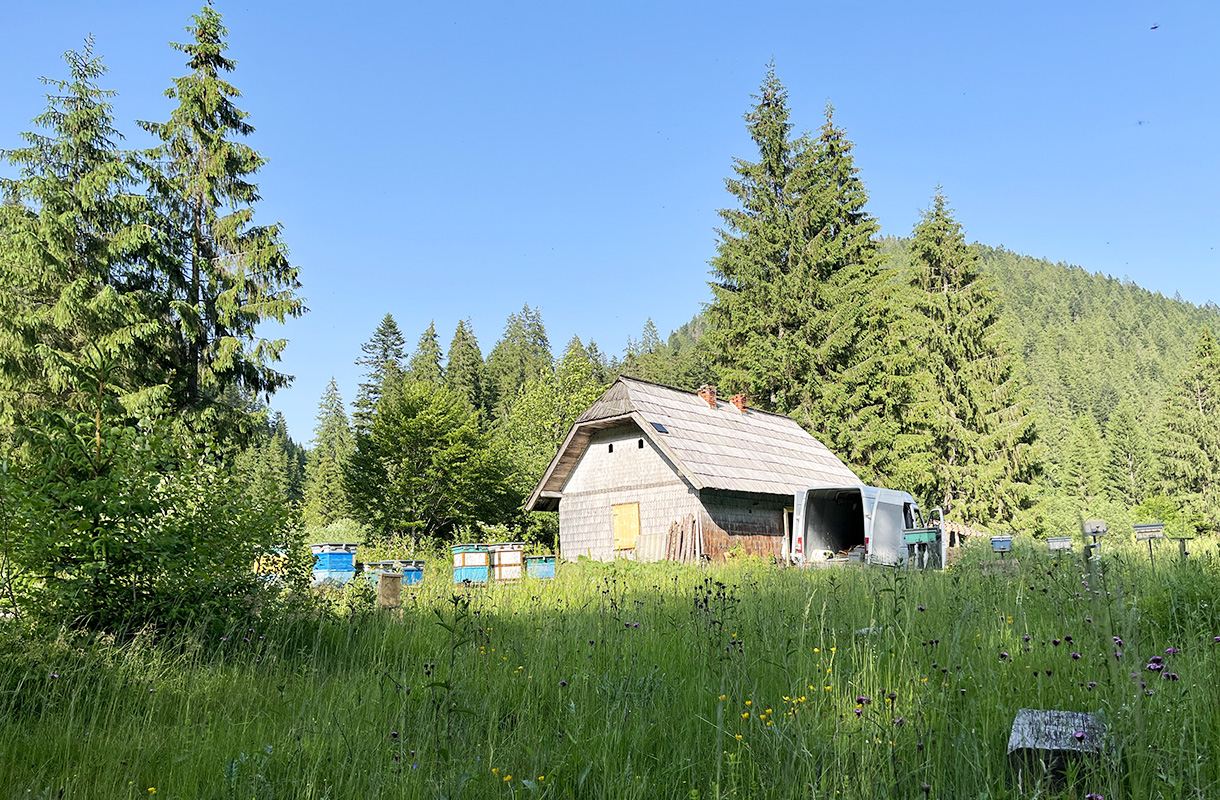
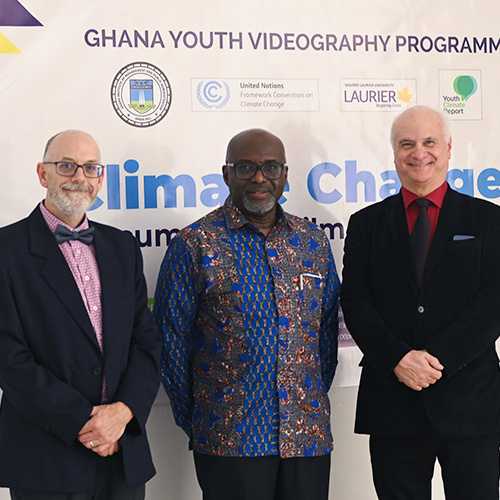
Jeff Grischow
Associate Professor, History
Magnus Mfoafo-M'Carthy
Professor, Social Work
Mark Terry
Adjunct Professor, Film Studies and Communications
At the end of November, Jeff Grischow, Magnus Mfoafo-M’Carthy and Mark Terry travelled to Accra, Ghana to premiere 11 short documentary films about climate change made by Ghanaian youth. The filmmakers, aged 18 to 35, showcased their work to inspire environmental action.
Six of the films were made by women videographers from Northern Ghana, which is a savannah region experiencing dramatic effects of climate change on local agriculture, including drought. Others spotlighted the intersections of disability and climate change, such as the experiences of blind farmers in Caroline Dari’s Blind to Limits and farmers with physical disabilities in Azara Zakaria’s Fading Harvests. Two of the Ghanaian videographers have disabilities themselves.
This is the second installment of the Ghana Youth Video Program, a research project led by Grischow, Mfoafo-M’Carthy and Terry with support from the Social Sciences and Humanities Research Council of Canada. Their collaborators include the Ghana Institute for Management and Public Administration.
“I have been visiting Ghana for 30 years and I am always inspired by the generosity of our Ghanaian friends and partners,” says Grischow. “We have learned so much about creating locally led social documentaries and their potential to inspire action.”
Grishchow and his colleagues were moved by the joy and excitement of the filmmakers, as well as the enthusiasm of audiences at the film showcase, which included NGO representatives, industry leaders and government officials. A film about building Ghanaian homes from recycled plastic was especially well received.
“We want to raise awareness among academics, who can use these films in their research and classrooms, and local and international stakeholders and policymakers,” says Grischow.
Shortly after the Ghanaian premiere, Terry proudly shared the film collection on an international stage at the recent United Nations Climate Change Conference (COP28) in Dubai.
